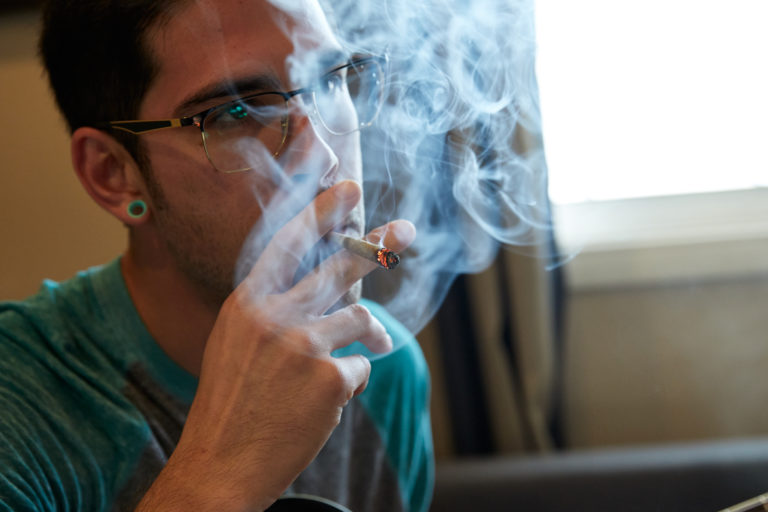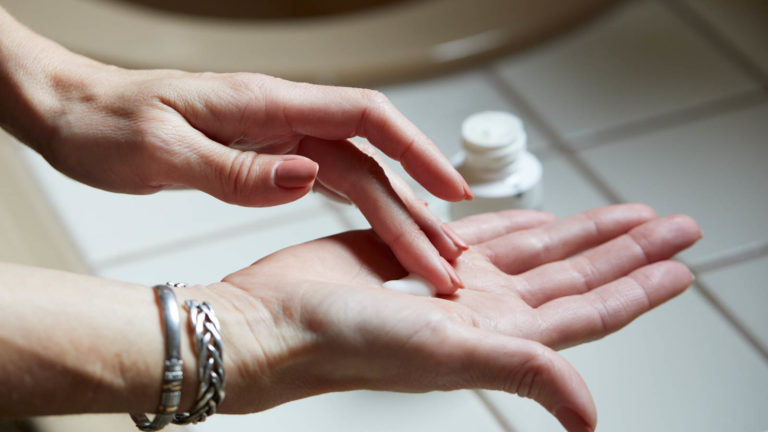Acne is a frustrating skin condition for as many as 50 million Americans. While acne affects 85% of adolescents, chronic breakouts can persist into adulthood. Multiple factors can contribute to the formation of pimples on the face and body, but does smoking marijuana cause acne?
Here you'll learn about the different causes and risk factors for acne and the research on cannabis and acne. Plus, we'll offer some expert tips to keep your skin glowing.
What causes acne?
There are plenty of myths surrounding dairy products and sugary sodas when it comes to acne. But the scientific evidence points to one primary cause — genetics. "Although there was once thought to be a link between acne and smoking tobacco, the evidence hasn't supported this idea," explains Dr. Adie Rae, a neuroscientist and scientific adviser to Weedmaps.
Some other common causes of acne:
- High testosterone levels and excess androgens
- Skin-clogging cosmetics
- Oily hair care products that make contact with the face
- Bacteria from dirty phones, pillowcases, and other objects that come in contact with the face
- Chronic stress, often stemming from a lifestyle lacking adequate sleep and balanced nutrition
Another common cause is normal hormonal fluctuations during the menstrual cycle when testosterone levels are higher. Acne breakouts are, in fact, more prevalent in adult females than males due to the shifting hormones of menstruation and, eventually, menopause.
But does smoking marijuana cause acne, and can cannabis exacerbate skin conditions that are already problematic?
Does cannabis make acne worse?
Current research indicates that smoking weed does not make acne worse in most people. There is only one study that has shown an association between adolescent cannabis smokers and acne.
 Photo by: Gina Coleman/Weedmaps
Photo by: Gina Coleman/WeedmapsImage lightbox

That study was conducted in France in 2015 and published in the scientific journal Dermatology. It showed that regular cannabis smoking (along with the consumption of chocolate and other sweets) was linked to moderate to severe acne in participants aged 15 to 24. However, other factors may have played a role in the subjects' acne, as young adulthood is marked by fluctuating hormones and represents the time when people are most likely to have acne. In other words, it is unclear whether smoking weed was the sole (or even the primary) cause of acne in these individuals.
Could cannabis reduce acne?
It is possible that certain cannabis products could help reduce or prevent acne, according to Dr. Rae. "Cannabis seed extract measurably reduces sebum in healthy adults. Sebum can plug hair follicles and lead to acne. Hemp seed oil has also been shown to reduce inflammation and sebum production, in vitro," Dr. Rae says.
 Photo by: Gina Coleman/Weedmaps
Photo by: Gina Coleman/WeedmapsImage lightbox

Dr. Rae cited one 2015 study published in the Pakistan Journal of Pharmaceutical Sciences, which showed that a cream containing 3% cannabis seed extract was a safe and effective way to manage acne. Specifically, the cream appeared to have a calming effect on the sebaceous glands of men's cheeks, decreasing the production of sebum and the appearance of acne.
"In human skin tissue, CBD has also been shown to reduce inflammation and sebum production. CBC and THCV also appear to reduce sebum,” says Dr. Rae. In fact, one 2014 study published in the Journal of Clinical Investigation demonstrated the anti-inflammatory effects of CBD on human skin cells in the laboratory. The researchers determined that CBD looks promising for treating acne.
However, not all cannabinoids may be beneficial in managing acne. Dr. Rae points out that in certain studies, CBG and CBGV actually increased sebum production.
Tips for healthy skin
Genetics may be the most prominent factor in maintaining clear skin, but a healthy lifestyle of sufficient sleep, sensible nutrition, and moderate exercise can also help maintain healthy skin.
Some other ways you can protect your body's largest organ:
- Practice stress reduction techniques like yoga, meditation, and deep breathing
- Wash your face twice daily, but avoid over-washing
- Exfoliate once a week to slough off dead skin cells, open the pores, and boost collagen production
- Drink plenty of water throughout the day
- Steer clear of junk food and other possible dietary triggers
Bottom line on cannabis and acne
Cannabis consumers and medical marijuana patients can be confident that smoking weed is not likely to have a significant connection to acne. But that doesn't mean there's no role for the plant.
"There isn't enough evidence to support the idea that cannabis smoking causes acne. There is, however, a growing body of promising evidence that cannabinoids and other oil extracted from the seed of the plant may be effective ingredients in a new generation of acne treatments," says Dr. Rae.
While dermatologists may not be prescribing cannabis as a treatment, certain cannabinoids may ultimately be integrated into a complementary acne-fighting regime.
Major contributions from Dr. Adie Rae.

